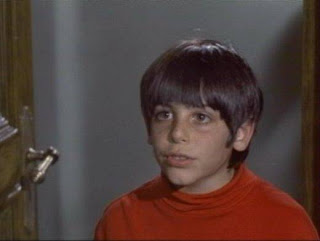Name a movie that about a lavender-coated, gay-vague monster who lures five children into his lair with the promise of candy, then tortures and terrorizes them, killing three, before inviting the one he deems "good" to become his apprentice.
No, it's not
Nightmare on Elm Street. But you were close.
It's
Willy Wonka and the Chocolate Factory, a early entry in the torture-porn genre that parents inflicted on Boomer kids in the summer of 1971, causing not a few of them to be traumatized for life. I still can't hear the song "Candy Man" without cringing.
The plot: Willy Wonka (
Gene Wilder), the ultimate capitalist, produces candy for the town. He offers a free tour of his factory to five kids who win a "golden ticket." Once they arrive, he terrorizes them.
He pretends to be disabled, and once they become adequately solicitious, does a somersault: "See, you were all sympathetic for nothing! I'm really not disabled!"
What a nasty thing to do!
Even a boat trip down a chocolate river provides an excuse for Willie to toy with their emotions. He starts shrieking:
Not a speck of light is showing, so the danger must be growing
Are the fires of Hell a-glowing? Is the grisly reaper mowing?
Oh, please -- they're just going to another part of the factory!
But then, he is always extremely volatile, level-head one moment, screaming the next.
Willy arranges for the children to be killed or transformed into something monstrous in retribution for some minor fault, like Billy Mumy's godlike demon in
"It's a Good Life."
1. The tv-obsessed Mike Teevee (Paris Themmen) is shrunk to the size of a tv image.
2. The bratty Veruca Salt (Julie Dawn Cole) falls down a garbage chute into the furnace, where she is burned to death.
3. The gum-chewing Violet Beauregarde (Denise Nickerson) is transformed into a giant blueberry, whereupon she explodes.
4. The gluttonous Augustus Gloop (Michael Bollner) drowns in a river of chocolate.
After they are murdered, Willy's slaves, the Oompa-Loompas, sing moralizing songs: if you refrain from chewing gum, over eating, being bratty, and watching tv, you'll "go far," like survive to the end of the torture factory tour.

Charlie (Peter Ostrum) is one of the irrepressibly good, blond waifs
who populate adult fantasies about childhood innocence (others include
Mark Lester, Jeremy Sumpter
, Macaulay Culkin
, and
Ricky Schroeder). He has an extremely creepy home life, living with four grandparents who are all bedridden -- and share the same bed. Gross!
Charlie's fault is larceny -- he and one of his grandfathers sneak into a secret lab and steal an experimental soft drink. But Willy just yells at Charlie instead of torturing him -- maybe he has a thing for blonds -- and the end offers to make him his apprentice torturer.
I guess even Freddy Krueger needed an assistant.
This was supposed to be fun? No wonder most of the child stars never acted on film again.
Peter Ostrum is now a veterinarian in New York.
Michael Bollner is a tax accountant in his native Germany.
Julie Dawn Cole limits herself to television.
Paris Themmen works in live theater and film. production.
Even Peter Stewart, who played one of Charlie's friends in town, never acted again.
Would you?
 2. Cry Wilderness (1987): a Bigfoot kidnaps Paul Cooper (Eric), but turns out to be nice. He's really terrorized by an escaped tiger.
2. Cry Wilderness (1987): a Bigfoot kidnaps Paul Cooper (Eric), but turns out to be nice. He's really terrorized by an escaped tiger.













































